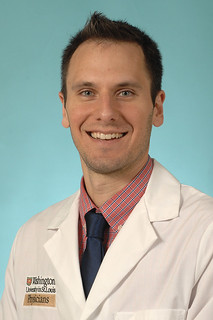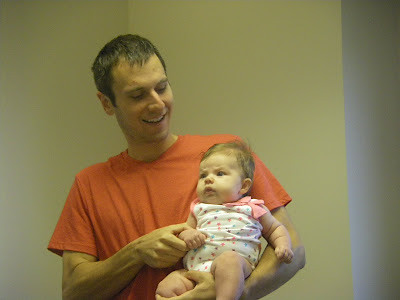...as you all know, Matt and I struggled to get pregnant and after one failed IVF, we got pregnant with AR after transferring three little totsicles. While I'm a mom now and, more than likely, won't be doing any more fertility treatments, it's a chapter of my life that I won't forget and I want to help other women going through the same sort of issues. With that being said, I recruited my favorite RE, Dr. Kenan Omurtag, to help do a Q&A post from the doctor's perspective but in terms that we can all understand.
Dr. Omurtag is an amazing doctor with an excellent bedside, or in my case Twitter-side, manner. He has recently joined the team at Washington University and writes for his own blog. Dr. Omurtag can be seen tweeting by the name of stlinfertility. He's accepting new patients. If we were to do more treatments, Dr. O would be stuck with me. :-) Here he is with AR when she was only three months old! A big thank you to Dr. O for helping me out, and hopefully, some readers out there, too.
First, tell us about yourself and how you decided to be an RE.
I was always interested in women's health and helping couples conceive always seemed very rewarding to me. While in medical school I enjoyed that RE's operated, and spent most time in clinic talking about reproduction.
What is your fertility specialty?
I like working with couples dealing with male factor infertility as well as endometriosis.
How did you become interested in it?
I think I gravitated to male factor infertility because I am a guy and because there is still a poor understanding of the sperm's role in infertility and RPL. We have good reason to believe that much of the common causes of infertility are related to female factors, but sperm probably plays more of a role than we think. I suspect that by the end of my career we will view male factor infertility differently then we do today. IN just the last 20 years are options for treating male factor infertility have changed dramatically with the first use of ICSI in 1993.
What is your definition of infertility (not the text book definition)? (See below.) A couple or individual who wants to conceive and cannot after trying an appropriate length of time.
When should a couple visit a fertility specialist?
When a couple has been having unprotected intercourse for 12 months without pregnancy they should seek out assistance from a fertility specialist. If the woman is > age 35 they should see a specialist after trying for 6 months. This is in response to the age related decline in fertility and meant to initiate a work up and intervene sooner rather than later as age can be limiting. Regardless of age, if a women has irregular menses, she should seek medical attention after 6 months of unprotected intercourse.
What are the most common reasons that patients visit an RE (i.e. male infertility, endometriosis, age, etc…)?
The most common reason for infertility is some type of ovulatory dysfunction (irregular periods, I.e not releasing an egg consistently every month). Polycystic ovarian syndrome is a common cuase of ovulatory dysfunction but that diagnosis can be "thrown around" too loosely. It is important to ask your OBGYN what criteria they are using to diagnose PCOS. I typically use the NIH definition: irregular periods and elevated signs of male hormone.
If a couple is coming to visit you for the first time, what should they expect to take away from the first appointment?
Admittedly, I can sometimes bombard people with too much information. My goal is to have a conversation with my patients and provide answers to their questions without lecturing them. I typically go over their history and then go over any necessary diagnostic testing and then I review treatment options. Typically I will provide all information but often times I will meet with the patient again after they have completed the initial work up. I try to touch on most treatment concepts in the first visit.
Do tightie whites vs boxers really make a difference?
Everyone always asks this, but the reality is that while it may show some effect on sperm motiliy it is unlikely contributing to anything clinical. Read another way: switching from briefs to boxers is not going to be help a man with low counts father a child.
Hot tubs?
Unless the guy spends hours a day in the hot tub, this is unlikely to be damaging.
How much caffeine is too much caffeine when TTC?
I would limit my self to 8 ozs/day.
When doing IUI, what are the average success rates?
Depends on age of the woman and the underlying indication for the treatment. Succss rates are measured in cycle fecund ability which is the probability of pregnancy in a given month. The average human being has a cycle fecund ability of 20% which over the course of 1 year = pregnancy in 85% of couples: hence why we recommend seeing an infertility specialist if not pregnant after 1 year. Again, this number is a moving target and depends on the patient and the medication used with IUI.
How many eggs are typically released during an IUI?
Depends on the medication used and the indication, but can be 1 or more.
When doing IVF, what is the average success rate?
Again depends on above. I recommend your readers look at SART.org to get average success rates for the country. We are a SART member clinic. SART is the society of assisted reproductive technologies. Not all clinics are SART members. What is a good number of eggs for egg retrieval? Depends depends depends…on the patient, her history, etc. This is such an individualized number that I will refrain from even stating one:)
Is there a goal number you like to retrieve? Out of the eggs retrieved, how many typically make it to embryo retrieval?
Another tough question and one I would defer to the reader's treating REI. While most mature eggs will be fertilized, not all will continue to grow.
At what point as a doctor, do you feel like a couple shouldn’t do any more treatments? This is the single most difficult thing as a fertility specialist. It is a moving target and different for everyone. My goal is to try and help guide patients to what is best and sometimes that is stopping treatments and looking at alternatives.
How do you tell them this?
It doesn't happen in one visit that is for sure. It is process. It is very difficult because we feel like we failed our patients if they don't conceive with our treatments. Its hard for physicians to stare their patients in the eye and tell them "I am out of options." Fortunately, while it happens it is still rare.
This is just a small introduction into infertility and the world surrounding it. If you have more questions, please leave a comment and I can pass them on to Dr. O or feel free to tweet him. Thanks again, Dr. O!



No comments :
Post a Comment